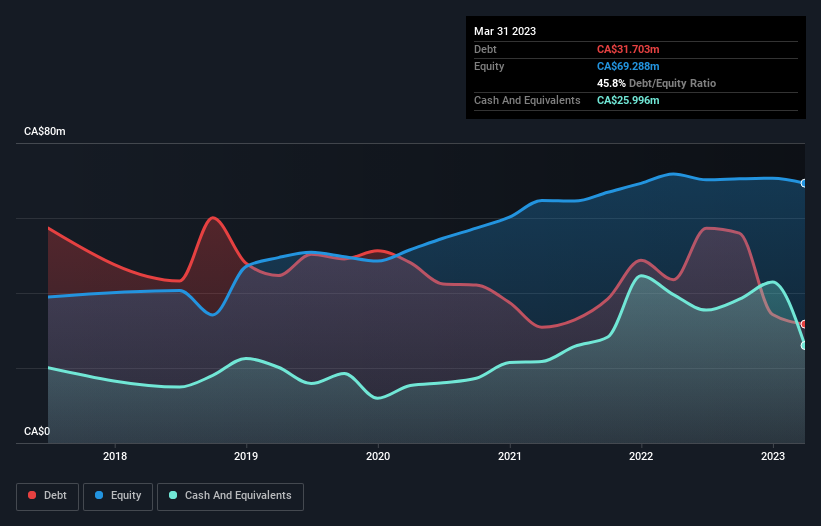Warren Buffett famously said, ‘Volatility is far from synonymous with risk.’ When we think about how risky a company is, we always like to look at its use of debt, since debt overload can lead to ruin. We note that Thunderbird Entertainment Group Inc. (CVE:TBRD) does have debt on its balance sheet. But should shareholders be worried about its use of debt?
When Is Debt A Problem?
Generally speaking, debt only becomes a real problem when a company can’t easily pay it off, either by raising capital or with its own cash flow. In the worst case scenario, a company can go bankrupt if it cannot pay its creditors. However, a more usual (but still expensive) situation is where a company must dilute shareholders at a cheap share price simply to get debt under control. By replacing dilution, though, debt can be an extremely good tool for businesses that need capital to invest in growth at high rates of return. The first step when considering a company’s debt levels is to consider its cash and debt together.
View our latest analysis for Thunderbird Entertainment Group
What Is Thunderbird Entertainment Group’s Debt?
You can click the graphic below for the historical numbers, but it shows that Thunderbird Entertainment Group had CA$31.7m of debt in March 2023, down from CA$43.5m, one year before. On the flip side, it has CA$26.0m in cash leading to net debt of about CA$5.71m.

How Strong Is Thunderbird Entertainment Group’s Balance Sheet?
According to the last reported balance sheet, Thunderbird Entertainment Group had liabilities of CA$97.5m due within 12 months, and liabilities of CA$23.9m due beyond 12 months. On the other hand, it had cash of CA$26.0m and CA$89.2m worth of receivables due within a year. So it has liabilities totalling CA$6.12m more than its cash and near-term receivables, combined.
Since publicly traded Thunderbird Entertainment Group shares are worth a total of CA$147.7m, it seems unlikely that this level of liabilities would be a major threat. Having said that, it’s clear that we should continue to monitor its balance sheet, lest it change for the worse. The balance sheet is clearly the area to focus on when you are analysing debt. But it is future earnings, more than anything, that will determine Thunderbird Entertainment Group’s ability to maintain a healthy balance sheet going forward. So if you’re focused on the future you can check out this free report showing analyst profit forecasts.
In the last year Thunderbird Entertainment Group wasn’t profitable at an EBIT level, but managed to grow its revenue by 32%, to CA$173m. With any luck the company will be able to grow its way to profitability.
Caveat Emptor
Despite the top line growth, Thunderbird Entertainment Group still had an earnings before interest and tax (EBIT) loss over the last year. To be specific the EBIT loss came in at CA$3.3m. Considering that alongside the liabilities mentioned above does not give us much confidence that company should be using so much debt. So we think its balance sheet is a little strained, though not beyond repair. We would feel better if it turned its trailing twelve month loss of CA$4.3m into a profit. So in short it’s a really risky stock. When analysing debt levels, the balance sheet is the obvious place to start. But ultimately, every company can contain risks that exist outside of the balance sheet. For example, we’ve discovered 1 warning sign for Thunderbird Entertainment Group that you should be aware of before investing here.
Of course, if you’re the type of investor who prefers buying stocks without the burden of debt, then don’t hesitate to discover our exclusive list of net cash growth stocks, today.
Valuation is complex, but we’re helping make it simple.
Find out whether Thunderbird Entertainment Group is potentially over or undervalued by checking out our comprehensive analysis, which includes fair value estimates, risks and warnings, dividends, insider transactions and financial health.
View the Free Analysis
Have feedback on this article? Concerned about the content? Get in touch with us directly. Alternatively, email editorial-team (at) simplywallst.com.
This article by Simply Wall St is general in nature. We provide commentary based on historical data and analyst forecasts only using an unbiased methodology and our articles are not intended to be financial advice. It does not constitute a recommendation to buy or sell any stock, and does not take account of your objectives, or your financial situation. We aim to bring you long-term focused analysis driven by fundamental data. Note that our analysis may not factor in the latest price-sensitive company announcements or qualitative material. Simply Wall St has no position in any stocks mentioned.